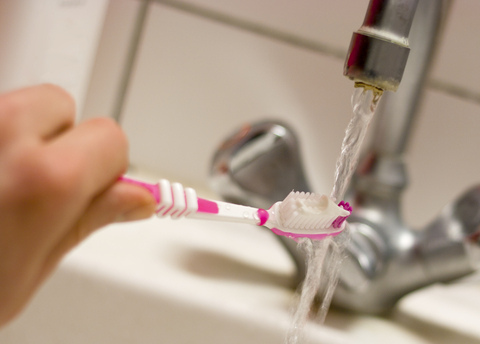August 4th, 2021

You may have heard talk about the germs that can reside on your toothbrush and thought, “really?”
It’s true—there are several kinds of bacteria that can lurk on the bristles of your toothbrush, including streptococci, staphylococci, Herpes Simplex I, and the Influenza virus. To protect your toothbrush from bacteria, Dr. Mariam Tariri and our team want you to consider the following three tips:
- Wash your hands before and after brushing.
- Allow the brush to air dry after each use, as harmful bacteria dies after being exposed to oxygen. It is best to disinfect your toothbrush weekly and allow it to dry in between use. Store the toothbrush in an upright position to allow water to drain and dry faster
- Replace your toothbrush every three to four months, or after being ill. Worn bristles are less effective in properly cleaning your teeth, and can actually be damaging to teeth if used too long!
We hope these tips help! Feel free to give us a call at our Everett office or ask us on Facebook if you have any questions!
July 28th, 2021

A dental sealant is a liquid that is applied to the teeth. The sealant hardens and provides a protective coating that is designed to reduce cavities and create a smoother tooth surface. Dental sealants are clear or white; they do not take away from the appearance of teeth. You can think about this treatment as being similar to varnish that protects a wood floor.
Sealants are not the same as fluoride treatments. The application is similar, but sealants are a semi-permanent protective coating. Dr. Mariam Tariri and our staff recommend that sealant applications for children begin soon after molars erupt, first molars around the age of six, and second molars around the age of 12.
Simple Application
Having sealants applied is not uncomfortable at all. First, your child's teeth will be cleaned and dried. A gel is applied, which helps the sealant adhere to the tooth, and then is rinsed away. Your child's teeth are dried again and the sealant is applied. A few seconds of exposure to a light source may be used to cure the sealant and make it semi-permanent. Sealants should last for a long time, normally between five and ten years.
Sealant Benefits
The coating on the surface of your child's teeth reduces the amount of acid contact. Normal acids in foods that are consumed can eat away at the surface of teeth. Bacteria also react to plaque formation and create more acid in the mouth. These small pits or weakened areas are prone to caries or cavity formation. Preventing cavities is a much better choice than drilling and filling damaged teeth.
A sealant also helps to smooth the chewing surfaces of your childn't teeth. The smoother surface is not as likely to retain small particles of food and bacteria. Your child's mouth stays cleaner and food is not left behind to form acids. The protective application can also be used on other teeth that have a rough surface, to protect the grooves or pits from decay.
After the sealant is applied, your child still needs to take proper care of his or her teeth. Regular brushing and flossing is required. Dr. Mariam Tariri may recommend fluoride treatments to strengthen and protect your child's teeth further.
If you have any concerns about sealants, please discuss them with during your child's next appointment at Colby Family Smiles. We want your little one's teeth to stay healthy for life.
July 21st, 2021

Dr. Mariam Tariri will tell you that while you are sleep, your mouth may be very active. If you find yourself waking up with headaches, facial pain, neck aches, or a sore jaw, you may have tooth grinding, a condition we also call bruxism.
We see many people who experience some extent of tooth grinding, but a very small percentage of the population actually experiences symptoms severe enough to warrant visiting a doctor. If you continually experience any of the symptoms listed above, we encourage you to give us a call at our Everett office so that we may be able to diagnose and treat the problem.
The most common treatments include:
- Reducing your stress level to help relax your jaw muscles and prevent grinding
- A custom-made night guard to cushion your teeth and protect them from damage
- Changing your eating habits. Coffee, tea, or alcohol before bed can increase your chance of nightly grinding
- If your jaw or teeth are misaligned, Dr. Mariam Tariri may also recommend a brace to decrease grinding.
Grinding your teeth can have serious consequences that, if left untreated, can lead to tooth fractures and damage to the TMJ (temporomandibular joint).
If you think your teeth may not be getting the rest they need at night, we encourage you to give us a call and schedule an appointment with Dr. Mariam Tariri. Call us today!
July 14th, 2021

Dr. Mariam Tariri and our team at Colby Family Smiles hear this question all the time. Millions of people have dental crowns that artificially restore the chewing surface of a tooth. Also known as caps, these restorations surround the entire portion of the tooth that is above the gum line. Crowns are custom fabricated to match the color, shape, and size of other teeth and are visually undetectable to others. Several types of materials can be used to create crowns, including stainless steel, resin, metal alloys, porcelain fused to metal, or ceramic. When properly cared for and accurately fit, crowns can stay in place for a decade or more.
There are many reasons to get a dental crown, including:
- To restore a broken or cracked tooth
- To protect a tooth after a root canal
- To restore a severely decayed tooth
- To help anchor a dental bridge
- To complete a dental implant
- To protect a tooth that is at high risk for developing decay
- For cosmetic purposes
Getting a dental crown
The process of getting a dental crown begins at our Everett office. X-rays are used to ensure the teeth are healthy enough to receive a crown. If the roots and surrounding bone are in satisfactory condition, the tooth will be numbed, filed, and reshaped in preparation for the crown. If the tooth root is not healthy, a root canal may be necessary first.
After the tooth is prepared, a special paste is placed over the upper and lower teeth to make impressions. These impressions serve as blueprints for the dental laboratory responsible for making the crown. They also help ensure the position of the new crown will not negatively affect a patient’s bite. The prepared tooth is protected by a temporary crown while the permanent one is made. When ready, the permanent crown replaces the temporary crown and is cemented in place.
To learn more about crowns, or to schedule an appointment with Dr. Mariam Tariri, please give us a call at our convenient Everett office!





